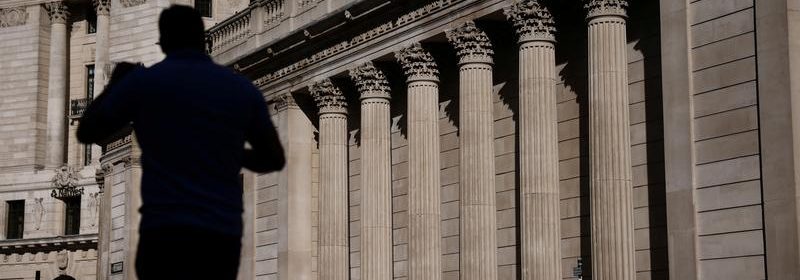Bank of England to wait until 2023 before raising rates: Reuters poll

BENGALURU (Reuters) – The Bank of England (BoE) will wait until 2023 before raising Bank Rate from a record low of 0.10%, a Reuters poll found, but economists said there was a chance an increase may come sooner than that on elevated inflation and a strong economic recovery.
During the pandemic the BoE chopped its base lending rate and restarted its printing presses to support the economy, but a mass vaccination programme against the coronavirus has allowed much of the country to reopen.
At its Aug. 5 meeting the BoE kept its stimulus running at full speed, even though it expects inflation to be double its 2.0% target around the end of the year. But it also set out how it could gradually tighten monetary policy.
The Bank said it would start reducing its stock of bonds when its policy rate was 0.50% by not reinvesting the proceeds of maturing debt, as long as that made sense for the economy. The Reuters poll taken between Aug. 9 and 13 found Bank Rate would reach 0.50% in 2023.
All but one economist who replied to an additional question said the Bank would start reducing its stock of purchases in 2023. Its holdings reached the targeted 895 billion pounds in November.
“We think 0.50% is roughly consistent with Governor Andrew Bailey’s past comments. But the speed of unwind has the potential to be a little quicker than we might have expected,” said James Smith, economist at ING.
Three-quarters, or 15 of 20, of respondents said a rate hike was more likely to come earlier than they expected rather than later. A growing number have pencilled in an increase before the end of next year.
Despite the spread of new coronavirus variants, Britain’s economy expanded by 4.8% last quarter and is expected to grow 2.6% this quarter, slightly above the 2.5% predicted in July but below the BoE’s projection of about 3.0%.
The poll consensus showed the pace would slow to 1.3% in the December quarter and to 0.8% in the first quarter of 2022.
On an annual basis, growth was pegged at 6.8% and 5.4% in 2021 and 2022, respectively – stronger than the 6.7% and 5.2% forecast in the previous poll.
PRICE RISE
As elsewhere around the world, a spike in inflation is a concern in Britain, especially with the central bank’s own projection that inflation would hit 4.0% by end-2021 – its highest in 10 years – having already touched 2.5% in June.
Poll medians showed consumer price inflation at 2.6%, 3.1%, 2.9%, 2.6% in Q3, Q4, Q1, Q2, respectively, higher than in July’s poll.
However, the BoE has said the spike in inflation would prove temporary, and most economists agree.
“The inflationary pressures are definitely stronger than most had anticipated earlier this year, but there are some very good reasons to wait this out until the global economy fully recovers from the pandemic and its aftershocks,” said Stefan Koopman, economist at Rabobank.
Central bankers will monitor the labour market as the government’s furlough programme – that expires at the end of September – could lead to a rise in unemployment in coming months.
More than 85% of 16 respondents said the unemployment rate would take at least a year to reach its pre-COVID-19 level.
Source: Read Full Article
